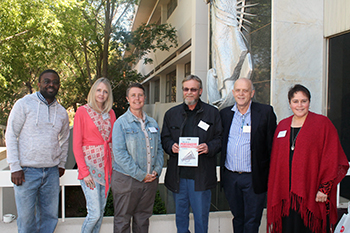Latest News Archive
Please select Category, Year, and then Month to display items
25 March 2024
|
Story Anthony Mthembu
|
Photo Lutendo Mabata
 Prof Nompumelelo Zondi, the newly appointed Vice-Dean: Research and Postgraduate Studies in the Faculty of The Humanities at the University of the Free State (UFS).
Prof Nompumelelo Zondi, the newly appointed Vice-Dean: Research and Postgraduate Studies in the Faculty of The Humanities at the University of the Free State (UFS).
Prof Nompumelelo Zondi has been appointed as Vice-Dean: Research and Postgraduate Studies in the Faculty of The Humanities at the University of the Free State (UFS). Prof Zondi assumed this new role on 1 March 2024 after serving as the Head of Department for African Languages at the University of Pretoria for seven years. “I consider this appointment as an opportunity of growth and learning more about higher education and the Faculty of The Humanities at large,” she said.
Prof Zondi indicates that part of her role is to spearhead the UFS Vision130 within the Faculty of The Humanities, and to ensure that the faculty assists the institution in becoming research-led, student-centred, and globally impactful.
Motivation for assuming this role
One of the primary reasons that led her to consider this role is sharing the knowledge she acquired as part of the Fulbright South African Research Scholar Programme. As a result of that experience and exposure, which went beyond the Ohio State University, she felt it befitting to implement some of the insights she acquired on a bigger scale. Therefore, even though she was impactful in her previous role, Prof Zondi believes that this is an exceptional and more desirable platform to do so. “I feel that I will have easier access to departments within the faculty, while also encouraging and supporting interdepartmental and faculty collaborations,” she explained.
A significant component of Vision 130
He believes that the elements that make up Vision 130 are interrelated. While she considers research central to Vision 130 – as she begins her journey at the UFS, she feels students deserve to be nurtured to further contribute to the university’s impactful research. Thus, student-centredness is the way to go. “I believe that students must be major role players in this Vision130; we must include them in the interactions and discussions that are part of the university’s strategic plan as well as in decision-making processes,” she said. As such, according to Prof Zondi, the more the faculty and the institution care for the students and involve them in Vision130 and in collaborations, the more research outputs the university will achieve.
International delegates attend SACOMM conference at UFS
2016-10-12

From the left: Prof Colin Chasi, Chairperson of the
South African Communications Association,
Dr Dalme Mulder UFS Lecturer; Dr Wilmien Marais,
UFS Lecturer; Prof Johann de Wet, former head of
UFS Department of Communication Science
Prof Tom O’Regan, University of Queensland (Australia)
and Prof Milli Rivera, Head of the UFS Department of
Communication Science during the conference on the
UFS Bloemfontein Campus.
Photo: Rulanzen Martin
Communication from within and below: Social Transformation and Inclusiveness. That was the theme of the 2016 South African Communication Association (SACOMM) conference, hosted at the Bloemfontein Campus of the University of the Free State (UFS) from 3 to 5 October 2016.
“Through this theme, participants were invited to submit papers that examined the role of communication in today’s tumultuous climate,” said Prof Mili Rivera, Head of the Department of Communication Science at the UFS.
A total of 140 delegates from other South African universities, as well as international delegates from Zimbabwe, Nigeria, the United Kingdom, United States, and Australia attended the conference. It was the second time in ten years that the UFS hosted the conference.
Organisation to mentor and support emerging scholars
Various staff members and students from the UFS Department of Communication Science presented papers during the three days.
Annette van Baalen and Dr Dalme Mulder, both lecturers in the department, won the best paper award in the Corporate Communication division. A number of emerging scholars also presented papers. “The organisation is committed to mentoring and supporting emerging scholars in the field of Communication Science,” said Prof Rivera.
Association must be agent of change in curriculum
Delegates discussed the role of the organisation (SACOMM) as an agent of change in terms of decolonising the curriculum. The focus was on training journalists to cover crises in a fair and balanced manner. The book The Art of Persuasive Communication - A Process (4th Edition) by Prof Johann de Wet, former head of the UFS Department of Communication Science, was also launched during the conference.
The next SACOMM conference will take place at Rhodes University in 2017.